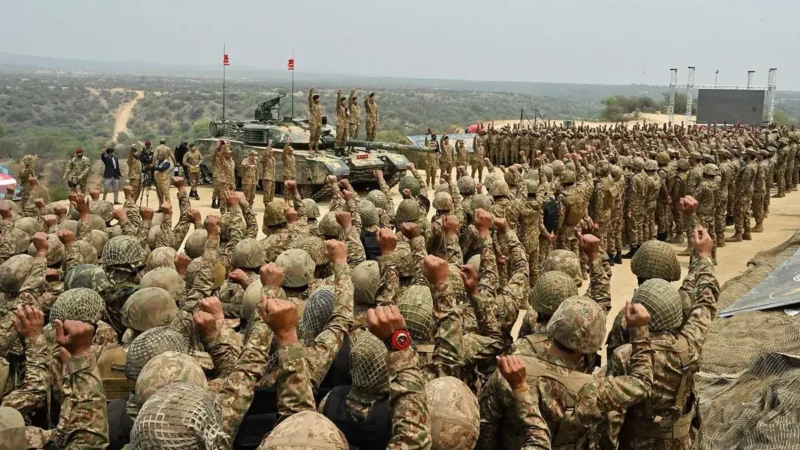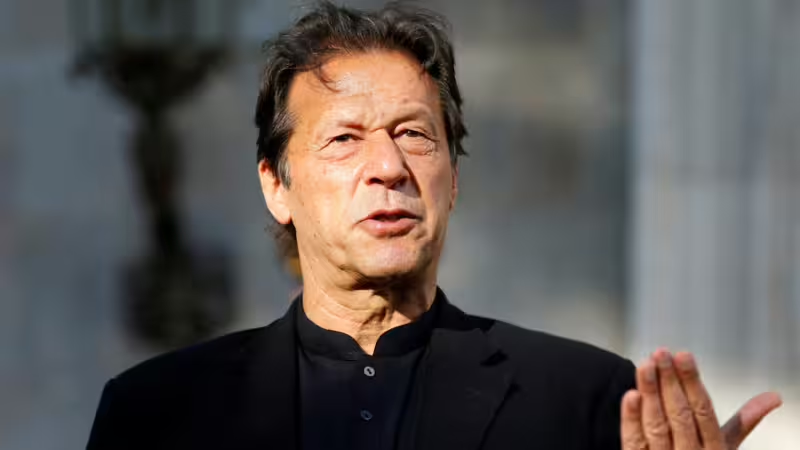Imran Khan of Pakistan issues a warning about civil disobedience in the face of demonstrations and legal issues.

Islamabad, Pakistan – Less than two weeks after his “final call” protest in Islamabad was forcefully dispersed, former Pakistani Prime Minister Imran Khan has pledged to continue his fight, threatening to launch a nationwide civil disobedience movement.
In a message posted on X, Khan, who has been imprisoned since August 2023 on numerous charges, announced the formation of a five-member negotiation team.
The team aims to discuss two key demands with the government: the release of under-trial prisoners and the establishment of a judicial commission to investigate the events of May 9, 2023 and November 26, 2024 – two dates on which Khan’s supporters held major protests but faced a backlash from the government and security forces.
“If these two demands are not accepted, a civil disobedience movement will begin on December 14. The government will bear full responsibility for the consequences,” Khan’s post in Urdu read.
“As part of the movement, we will urge overseas Pakistanis to limit remittances and start a boycott campaign. In the second phase, we will escalate our actions further.”
The announcement comes as Khan was indicted for his involvement in an attack on military headquarters on May 9 last year, while he was also slapped with charges of “terrorism” for his role in protests that besieged the federal capital last month.
Khan’s call for protests in Islamabad mobilised thousands of supporters, primarily from Khyber Pakhtunkhwa, a province governed by his Pakistan Tehreek-e-Insaf (PTI) party.
The crowd, which was led by Khan’s wife Bushra Bibi, departed on November 24 and eventually reached Islamabad two days later after crossing several roadblocks and obstacles, but was met with brute force from the state.
A late-night security operation involving paramilitary Rangers and police dispersed the crowd in less than three hours. Bushra Bibi and Khyber Pakhtunkhwa Chief Minister Ali Amin Gandapur fled back to the province amid the crackdown.
While the government accused PTI supporters of causing the deaths of four security personnel during the protests, it has denied any civilian casualties.
The PTI leadership, after issuing conflicting statements regarding the number of deaths, has said at least 12 people belonging to the party died during the protest, of which at least 10 were shot.
Fawad Chaudhry, a senior PTI leader and former federal minister, criticised the government for its treatment of Khan, who he claimed was being held in harsh conditions.
“Keeping a former prime minister in a death cell without basic necessities will only deepen resentment and widen the rift,” Chaudhry told Al Jazeera.
He emphasised that the government’s actions left Khan with no option but to escalate his protests.
“This call for civil disobedience is conditional on the success or failure of negotiations, but it is a serious step. If overseas Pakistanis, particularly those from Khyber Pakhtunkhwa, halt remittances, it will significantly impact the government’s economic plans,” he said.
Pakistan’s economy is highly reliant on foreign remittances. Overseas Pakistanis send close to $30bn back home every year. Central bank figures show that in the first 10 months this year, $28bn have already been sent to the country.
Political analyst Fahd Hussain believes Khan’s call for civil disobedience reflects an attempt to regain momentum after the perceived failure of the recent protests in Islamabad.
“Organising a mass movement so soon after the ‘final call’ may not be easy. The party must first reorganise after the chaos,” Hussain told Al Jazeera.
This is not the first time Khan has called for civil disobedience. In 2014, he led a similar campaign against then-Prime Minister Nawaz Sharif’s government, urging supporters to stop paying taxes and utility bills.
However, the movement ended with a whimper a few months later, following the armed attack on the Army Public School in Peshawar, in which more than 140 children were killed by the Tehreek-e-Taliban Pakistan (TTP). As the Pakistani government planned to launch a major military operation against the armed group, all political parties were brought together to consult and present a united front. The PTI, which was in the midst of a sit-in that had lasted for more than 100 days, also decided to end its protest.
Imtiaz Gul, head of the Center for Research and Security Studies (CRSS) in Islamabad, views civil disobedience as a way to pressure the state when a party faces the full might of government machinery.
“These tactics may not yield immediate results but can keep the government on edge and highlight Khan’s demands nationally and internationally,” Gul said.
Khan, who served as prime minister from August 2018 to April 2022, claims his removal through a parliamentary no-confidence vote was orchestrated by the military, in collusion with the United States and political rivals. The military has consistently denied these allegations.
Islamabad-based political analyst Cyril Almeida believes Khan’s fate hinges on either street protests or a deal with the military establishment, led by current army chief, General Asim Munir, who took over the command in November 2022.
Munir was previously appointed as the head of the Inter-Services Intelligence, Pakistan’s premier intelligence agency, under Khan’s governance before being removed only eight months into the job.
“Street protests complement negotiations, raising the cost on the government and military for keeping him in jail. But the problem remains the same, the current army chief Asim Munir is implacably, perhaps irrevocably, opposed to Imran Khan being a major governing figure again,” Almeida, the Islamabad-based analyst, told Al Jazeera.
“So long as Munir is around and in control of his military, Khan’s chances of a negotiated settlement are dim.”





